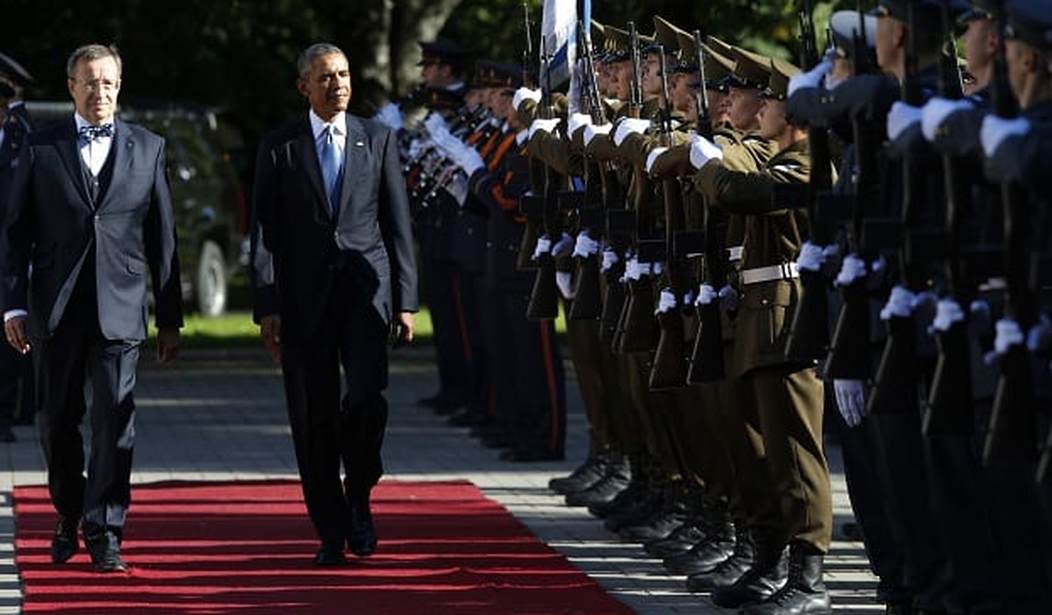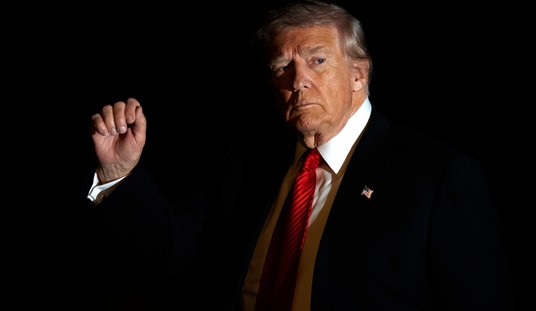 Yesterday in Talinn, Estonia gave a speech that he should have given months, if not years, ago. Addressing the people of Estonia – the NATO member most directly threatened by Russian expansionism — and, indirectly Vladimir Putin, Obama drew yet another of his infamous red lines:
Yesterday in Talinn, Estonia gave a speech that he should have given months, if not years, ago. Addressing the people of Estonia – the NATO member most directly threatened by Russian expansionism — and, indirectly Vladimir Putin, Obama drew yet another of his infamous red lines:
First, we will defend our NATO Allies, and that means every Ally. In this Alliance, there are no old members or new members, no junior partners or senior partners — there are just Allies, pure and simple. And we will defend the territorial integrity of every single Ally. Today, more NATO aircraft patrol the skies of the Baltics. More American forces are on the ground training and rotating through each of the Baltic states. More NATO ships patrol the Black Sea. Tonight, I depart for the NATO Summit in Wales, and I believe our Alliance should extend these defensive measures for as long as necessary. Because the defense of Tallinn and Riga and Vilnius is just as important as the defense of Berlin and Paris and London. (Applause.)
…
During the long Soviet occupation, the great Estonian poet, Marie Under, wrote a poem in which she cried to the world: “Who’ll come to help? Right here, at present, now!” And I say to the people of Estonia and the people of the Baltics, today we are bound by our treaty Alliance. We have a solemn duty to each other. Article 5 is crystal clear: An attack on one is an attack on all. So if, in such a moment, you ever ask again, “who will come to help,” you’ll know the answer — the NATO Alliance, including the Armed Forces of the United States of America, “right here, [at] present, now!” (Applause.) We’ll be here for Estonia. We will be here for Latvia. We will be here for Lithuania. You lost your independence once before. With NATO, you will never lose it again. (Applause.)
It is easy to see why this speech was so well received in the Baltic States because it served the same purpose a straw offers a drowning man. Similarly, here among the demoralized followers of the Lightworker it was hailed as something magnificent:
This is the ultimate commitment, given by the ultimate authority, in the very place where the commitment would be tested—and would have to be honored. There’s no turning back from that. Today, for the first time perhaps, Eastern Europeans have reason to believe it. And Vladimir Putin? His depredations have brought about the very result he claimed most to fear: a reanimated NATO rededicated to the defense of all its members, new and old, West and East, backed by the ultimate commitment of the United States.
In Tallinn, President Obama gave the most important speech about European security—and issued the most important pledge—of the post-Cold War era.
The pathetic naif Max Fisher, writing at the cash-burning machine known as Vox.com, has a story headlined Obama’s Russia paradox: Why he just threatened WWIII in order to prevent it:
But no one is really sure whether the US and other Western European countries would be willing to go to war against Russia should Putin invade a peripheral NATO member such as Estonia or Latvia. Western analysts are legitimately divided on how this would play out, and it is not hard to find former — or current — US officials who worry that, if the moment came for NATO to launch World War III in defense of Estonia, they would decide that it was not worth the trouble.
That’s why Obama went to the Estonian capital of Tallinn this week, and why he stood up with the Estonian prime minister to pledge as clearly as possible that he would definitely go to war against Russia if it came to it — precisely so that it never will come to that.
Talk is cheap and that is exactly what Obama provided. I’d be surprised if anyone thinks that Putin intends to “protect” ethnic Russians in the Baltic States, but particularly in Latvia and Estonia, by rolling tanks across the frontier and provoking an Article 5 response. You need only look to Moldova and Ukraine for the models. There will be astroturfed Russian nationalist movements, demands for “self-determination,” street demonstrations, and ultimately insurgency and civil war. Article 5 of the North Atlantic Treaty will not prevent this and will not authorize NATO action. The movement of about 200 into temporary garrisons in Estonia will serve more of a provocation than a show of support.
The administration’s actions indicate that at some level they believe that Putin’s territorial ambitions are a passing phase and they wish to do nothing to upset the geopolitical status quo (or alternatively they believe if they just partition Czechoslovakia that all will be well), On the other hand, Putin’s actions indicate that he sees everything up for grabs.
When Obama and Estonia’s president, Toomas Hendrik Ilves, gave a joint press conference yesterday, Ilves brought up the fact that NATO is slavishly adhering to the “NATO-Russia Founding Act.” This agreement signed In 1997 contains the statement:
“NATO reiterates that in the current and foreseeable security environment, the Alliance will carry out its collective defense and other missions by ensuring the necessary interoperability, integration, and capability for reinforcement rather than by additional permanent stationing of substantial combat forces.”
While not legally binding it has been used as a rationale to prevent NATO from stationing, on a permanent basis, troops nearer to the Russian border.
PRESIDENT ILVES: Well, from our side, first of all, NATO did decide to freeze its relations with Russia several months ago. But on the issue in terms of what is the — what are the implications of the NATO-Russia Founding Act, I suggest all those who say we can’t do anything because of the NATO-Russia Founding Act read the NATO-Russia Founding Act, which says that these conditions hold — to quote — “in the current and foreseeable” future, or “the security environment of the current and foreseeable” future. That was the security environment of 1997, when Boris Yeltsin was President, and there had been no violations of either the U.N. Charter or the 1975 Helsinki Final Act, the 1990 Paris Charter.
So I would argue this is an unforeseen and new security environment, and therefore one has to hold on to certain provisions. It does not mean we have to give up the whole act, but certainly when an agreement in certain parts no longer holds, well, then it’s time to make a change.
I mean, the NATO-Russia Founding Act has been violated by Russia. We continue to support the vision of that document, but its substance has changed dramatically, and I am confident that all of NATO’s actions are and will be conducted in accordance with its international commitments as an alliance.
Ilves is correct. In 2007, Russia abrogated the Conventional Forces in Europe treaty. The agreement was further breached by the Russian pummeling of Georgia (the country not the American state, for the benefit of Media Matters “fellows” who might be reading this) in 2008. Now it is blatantly in violation of the Intermediate Range Nuclear Forces treaty. This year it has stripped Crimea from Ukraine and is trying to gouge out a large chunk of Easter Ukraine. The “current and foreseeable security environment” of 1997 no longer exists.
The response he received was gibberish:
PRESIDENT OBAMA: The circumstances clearly have changed. And I think this will be a topic of discussion in Wales. Beyond the issue of that particular document, our top priority has been to make sure that there is no ambiguity when it comes to our Article 5 commitments to our NATO Allies. And as a consequence of the rotations that have been increased, the presence of U.S. troops in the course of those rotations and additional NATO Allies, what we want to send a clear message to everyone is, is that we take those commitments seriously.
Essentially, Ilves was given the brush off. Obama acknowledged that circumstances have changed but he didn’t acknowledge that Russia has violated its obligations under the Russia-NATO Founding Agreement. He didn’t say that permanent garrisons in Estonia, which Estonia desperately wants, are on the table. He really didn’t say much of anything.
In the high stakes game now being forced upon NATO and Europe by Putin, the most valuable tool any leader has is the value of his word. If you are as good as your word your adversaries know what lines cannot be crossed. Unfortunately, we have all seen how statements made by Obama are just so much vapor. When taken in context of Obama’s actions and statements to date, Talinn may be safe but the northeastern third of Estonia might do well to brush up on its Russian.













Join the conversation as a VIP Member